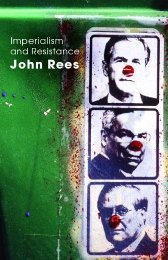
As a leading figure in the international anti-war movement, John Rees has probably had more opportunity to reflect, debate and discuss the general trajectory of the Imperialist powers since the events of 9/11 than most other people. His latest book builds on articles he’s written for the International Socialist Journal, and brings them together in an attempt to explain the forces at work behind the “war on terror”. He also offers both a method to oppose the drive to war, and an alternative to the society that generates it.
John Rees opens the book, by looking at why the US is the most simultaneously the most powerful military nation in the world, and yet is no longer “capable of sustaining a long period of stable capitalist development”. He argues the world is a much more competitive environment than ever before, and the economic conflicts between states are ending up being resolved in the political sphere – hence the battles over trade agreements and in a more heated form in the Middle East.
The book then looks at the role of oil – its importance and centrality to capitalism and hence why Imperialist nations have fought for control of the Middle East since the early 1900s. Interestingly Rees also looks at how the interests of multinationals are tied up with the states they are linked to – nowhere more obvious than with the huge oil corporations that first relied on British and then US military might to protect their profit making abilities.
The final chapters analysis how the global world system we live in, have lead to greater and greater inequality and how our democratic rights are being trampled on to help further the exploitation at capitalism’s heart.
John Rees was priviledged to have seen some of the “democratic revolutions” that struggled to overthrow the dictatorships of East Europe and Indonesia – he brings together these experiences with a general explanation of where the power lies to change society (the mass working classes of the world) to show how struggles for liberation and democracy have one or lost. He concludes that “Who wins [revolutions], and how much they win, is decided to a significant degree by the organisational and political capacities of the left”.
The last chapter “Resisting Imperialism” looks at the type of anti-war and anti-imperialist movements that we need to stop Imperialism, and to bring about a world without war and competition at it’s heart.
“Imperialism and Resistance” is not an easy book, but it is a book that is designed to strengthen the anti-war movement. For that reason it’s one that should be read, debated and discussed…. something that the anti-war movement, at least in this neck of the woods, is very good at.
No comments:
Post a Comment